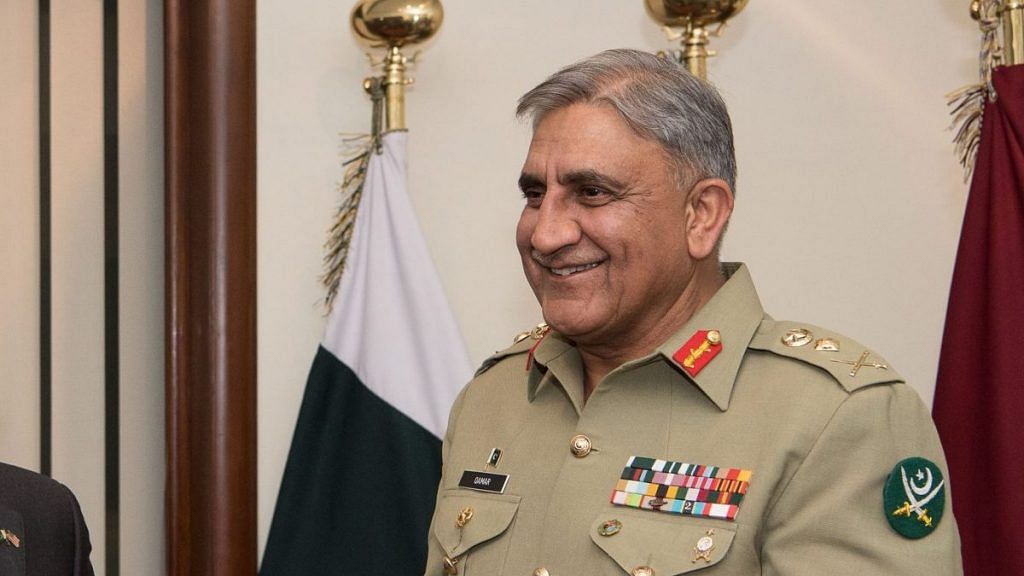New Delhi: A stable relationship between New Delhi and Islamabad is key to unlocking the potential of South and Central Asia by ensuring connectivity between East and West Asia, Pakistan Army chief General Qamar Javed Bajwa said Thursday.
He was addressing Pakistan’s first-ever Islamabad Security Dialogue, a two-day initiative organised by the country’s National Security Division in collaboration with its advisory board, comprising five think-tanks.
“This potential (of South and Central Asia), however, has forever remained hostage to disputes and issues between two nuclear neighbours. Kashmir dispute is obviously at the head of this problem,” he said.
Without the resolution of the Kashmir dispute through peaceful means, Bajwa said, the process of “sub-continental rapprochement” will always be susceptible to derailment due to “politically motivated bellicosity”.
“However, we feel that it is time to bury the past and move forward,” he added.
Pakistan’s commitment to peaceful and dignified dialogue in resolving disputes is a choice of rationality and not as a result of any pressure, he added.
On Wednesday, Pakistan Prime Minister Imran Khan had also addressed the Islamabad Security Dialogue, which is aimed at devising a holistic strategic road map for the nation in line with the premier’s vision.
He said India will benefit economically by having peace with Pakistan as it will provide New Delhi direct access to resource-rich Central Asia region. However, he added, it is up to India to take the first step.
Last month, the Ministry of External Affairs had said New Delhi desires normal neighbourly relations with Pakistan and is committed to resolving all issues bilaterally in a peaceful manner.
On 24 February, India and Pakistan issued a joint statement agreeing to strictly observe the 2003 ceasefire agreement at the border, “in the interest of achieving mutually beneficial and sustainable peace along the borders”.
Pakistan’s statements on India drew a mixed response from experts.
“This change in Pakistan’s behaviour, which notably comes after India and Pakistan’s recommitment to ceasefire agreement, is a good initiative,” said Lt Gen. Vinod Bhatia (retd), India’s former director general of military operations.
“More importantly, it’s a strategic imperative. After J&K’s special status was revoked in August 2019, Pakistan refused any dialogue with India. But as India’s stature has risen, Islamabad has taken note of it.”
Sushant Sareen, a senior fellow at the Observer Research Foundation in India, called the statements from Pakistan’s Army chief and Prime Minister an “image-building exercise”.
Pakistan has faced global scrutiny over its role with respect to terrorists and terrorist organisations that operate from its soil. Last month, the terror financing watchdog Financial Action Task Force (FATF) lauded Pakistan’s progress but retained it on its grey list as three of the 27 goals set for the country remain unfulfilled.
Also Read: Behind Pakistan’s talks offer to India lies a Khan-Bajwa plan
Bajwa’s CPEC ‘contradiction’
During his speech, Bajwa also spoke on the China-Pakistan Economic Corridor (CPEC), a collection of infrastructure projects that have been under construction throughout Pakistan since 2013 under Chinese President Xi Jinping’s ambitious Belt and Road Initiative (BRI).
“CPEC has been at the heart of our economic transformation plan and we have left no quarter to declare its necessity for addressing our economic woes,” he said.
However, he added: “Let me also emphasise that while CPEC remains central to our vision, only seeing Pakistan through CPEC prism is also misleading.”
CPEC remains a major irritant for India since it runs through Pakistan-occupied Kashmir (POK).
The two remarks made by Bajwa with respect to CPEC constitute a contradiction, experts said.
“Pakistan has been trying to sell the lemon called CPEC which is increasingly unviable. Many countries try to please Pakistan by expressing an interest in CPEC but no one has yet invested a single penny in it,” said Sareen. “With no other cards on the table, how is it possible not to view Pakistan through the prism of CPEC?”
Edited by Sunanda Ranjan
Also Read: India, Pakistan agree to observe ceasefire along LoC, pull back specialised offensive units
